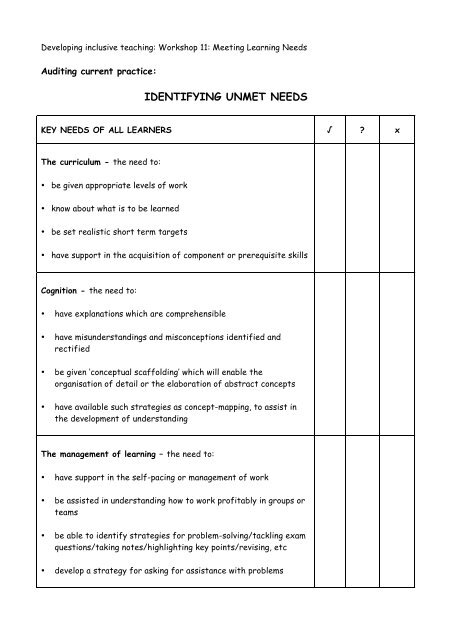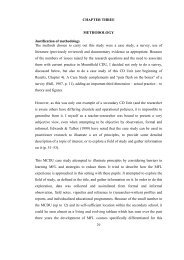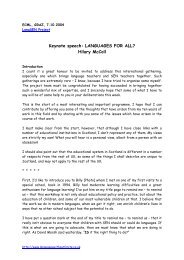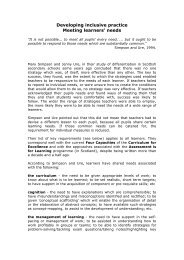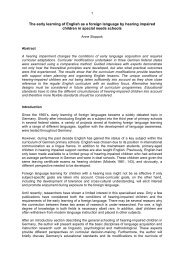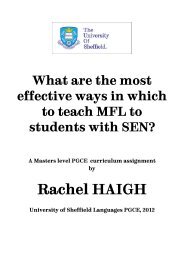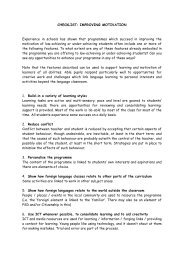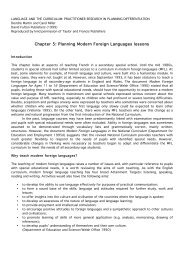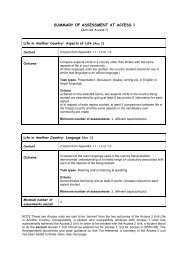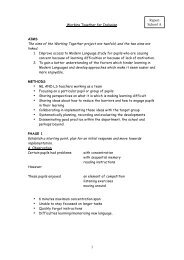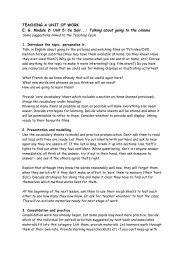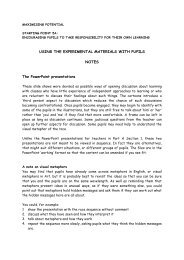IDENTIFYING UNMET NEEDS - Languages Without Limits
IDENTIFYING UNMET NEEDS - Languages Without Limits
IDENTIFYING UNMET NEEDS - Languages Without Limits
You also want an ePaper? Increase the reach of your titles
YUMPU automatically turns print PDFs into web optimized ePapers that Google loves.
Developing inclusive teaching: Workshop 11: Meeting Learning Needs<br />
Auditing current practice:<br />
<strong>IDENTIFYING</strong> <strong>UNMET</strong> <strong>NEEDS</strong><br />
KEY <strong>NEEDS</strong> OF ALL LEARNERS √ ? x<br />
The curriculum - the need to:<br />
• be given appropriate levels of work<br />
• know about what is to be learned<br />
• be set realistic short term targets<br />
• have support in the acquisition of component or prerequisite skills<br />
Cognition - the need to:<br />
• have explanations which are comprehensible<br />
• have misunderstandings and misconceptions identified and<br />
rectified<br />
• be given ‘conceptual scaffolding’ which will enable the<br />
organisation of detail or the elaboration of abstract concepts<br />
• have available such strategies as concept-mapping, to assist in<br />
the development of understanding<br />
The management of learning – the need to:<br />
• have support in the self-pacing or management of work<br />
• be assisted in understanding how to work profitably in groups or<br />
teams<br />
• be able to identify strategies for problem-solving/tackling exam<br />
questions/taking notes/highlighting key points/revising, etc<br />
• develop a strategy for asking for assistance with problems
KEY <strong>NEEDS</strong> OF ALL LEARNERS √ ? x<br />
Motivational factors – the need to:<br />
• be motivated to learn; to expect success and progression in<br />
learning<br />
• be confident; to expect problems to be capable of resolution<br />
• have high but attainable goals; to recognise purpose in the<br />
learning process<br />
• value the skills and knowledge acquired in school and to have an<br />
expectancy that these are a springboard for future learning<br />
Personal factors – the need to<br />
• have idiosyncratic personal issues taken note of, eg times of<br />
crisis or stress<br />
• have personal circumstances taken into account, eg lack of<br />
facilities for doing homework, lack of parental support or<br />
encouragement<br />
• have assistance with improving personal and interpersonal skills,<br />
low self-esteem etc;<br />
• have help in dealing with peer group pressure<br />
Additional factors<br />
From: http://www.languageswithooutlimits.co.uk/workshop11.html


